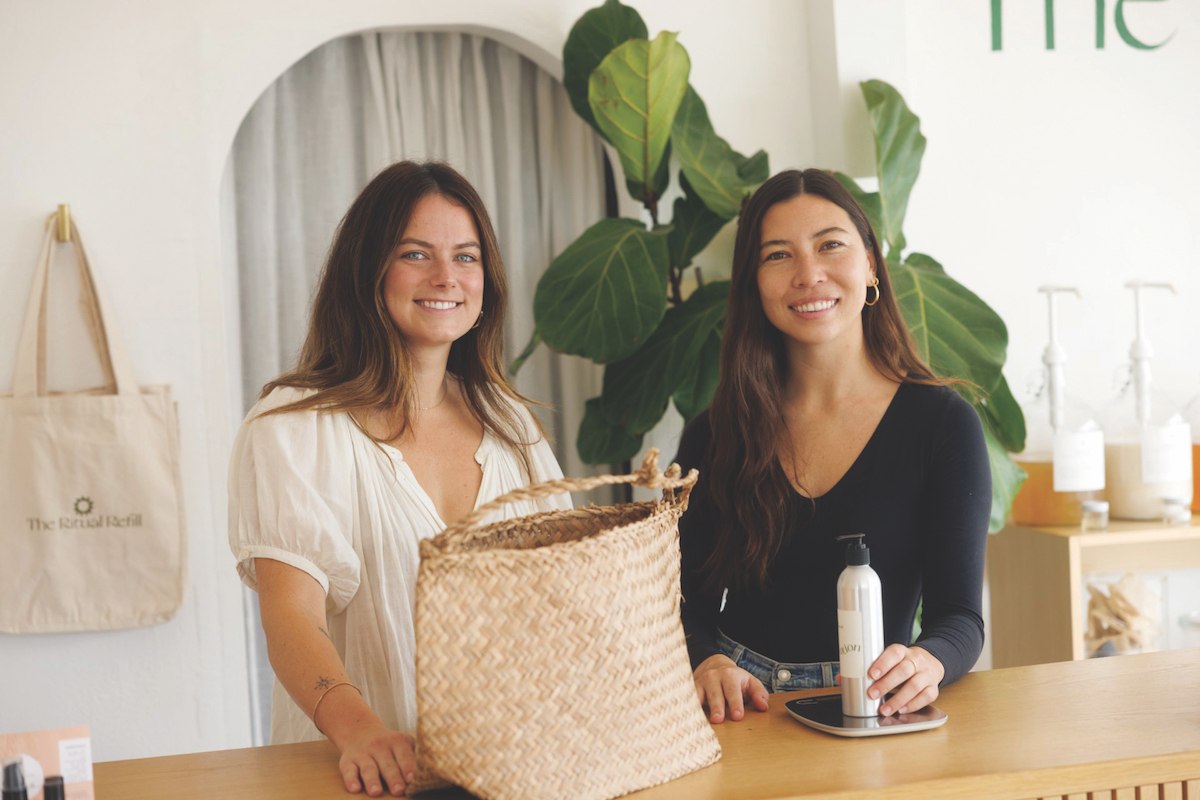
Refill shops and an eco-friendly packaging showroom have popped up in Laguna as more people seek to embrace sustainable living.
By Sharon Stello
Thea Pauley has practiced zero-waste living for at least a decade. She composts food scraps, wears mostly secondhand clothing, only buys items with minimal packaging, if any—looking for materials that can be composted—and uses refillable bottles for shampoo, dish soap and other household products. The only waste coming into her home is junk mail and gifts from other people.
“For my home to become a zero-waste home, it took about four years—just one thing at a time,” Pauley says. “… Now it’s pretty on point.”
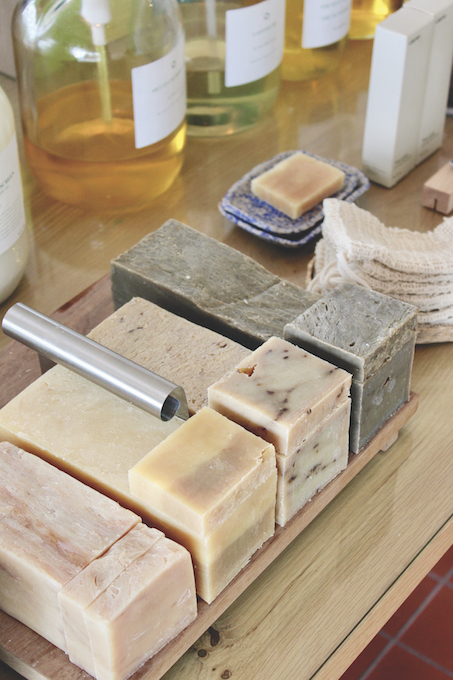
Pauley also helps others adopt this sustainable lifestyle. She owns Eco Now, a regional chain of refill stores including one that opened last fall in downtown Laguna Beach. Located in the Lumberyard Mall on Forest Avenue, Eco Now offers an entry point to making your home more environmentally friendly: Among a vast array of products, jugs of soap, laundry detergent and the like can be pumped into reusable containers while chewable toothpaste tablets allow customers to forego the hard-to-recycle tubes, and canisters of basics like baking soda and borax can be scooped into a jar in the amount desired. This is the second such shop to pop up in town recently: The Ritual Refill, owned by locals Shannon Hall and Danielle Holland, opened in north Laguna in early 2022 with similar products.
“We are both passionate about the importance of respecting the earth and keeping it clean for future generations,” Holland says. “Our goal is to encourage others to begin or continue their journey of low-waste living.”
This eco-friendly effort seemed a perfect fit for Laguna, a city that has banned eateries from using disposable plastic cutlery and polystyrene takeout containers and consistently wins the Wyland National Mayor’s Challenge for Water Conservation. If ever there was a place for refillable home and beauty products, surely this is it.
“We loved the concept and would drive as far as an hour to visit our favorite refill shops from San Diego to LA,” Hall says. “We felt that a similar shop would really resonate with our town.”
Becoming Eco-Conscious
To get started, Pauley suggests doing a “trash audit” and making little swaps here and there rather than overhauling everything at once, which can feel overwhelming.
“Look at your trash can. What are you throwing in there? Is it bathroom packaging? … Refill it. If it’s food packaging, you can shop at a farmers market,” she says. “What material is it? Is it plastic? Is it cardboard? Because the plastics are the problem right now.”
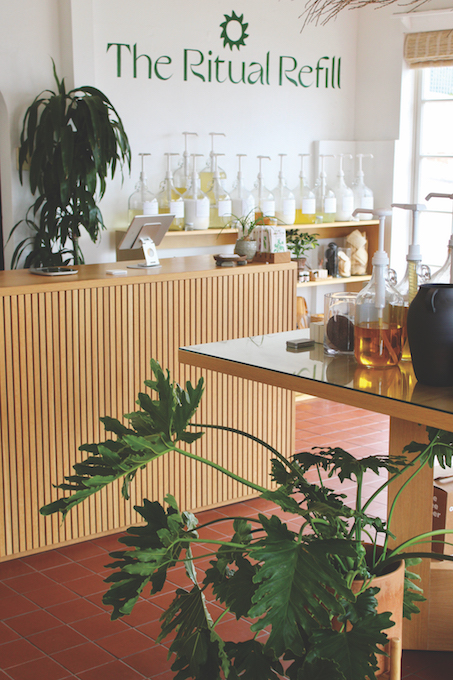
Both Pauley and Holland recommend starting in one room. As a first step, Holland advises switching hand and dish soap for refillable options. “It’s an easy swap,” she says.
Pauley believes that sustainability moves people toward a more minimalist mindset. “That is really good for your mental health,” she says. “People who have less can focus more on doing things than buying things. It gives your life more fulfillment.”
Reduce, Reuse, Refill
Hall and Holland, who both grew up in Southern California with a deep appreciation for nature and the ocean, worked for years in the retail and apparel industries where they witnessed the incredible amount of waste generated by consumers. With The Ritual Refill store, they wanted to provide an eco-friendly alternative.
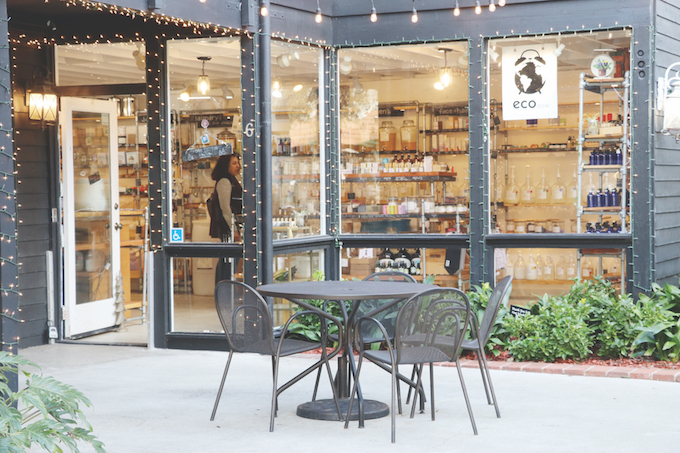
“Whether it’s single-use products or fast fashion, there is so much waste produced in consumerism everyday,” Holland says. “This inspired us to start a business where we could offer more sustainable swaps like refilling your essentials and buying secondhand clothing.”
Peruse the rack of vintage and repurposed apparel, slice off a piece of bar soap or bring a clean container and get it filled with all-natural products priced by the ounce. Reusable glass and aluminum bottles may also be purchased—and customers will get 5% off their next refill when they bring back the bottle; clean glass jar donations are also accepted for the shop’s freebie basket. Free local delivery is offered, too.
“We have over 50 refillable products ranging from bath, body, kitchen, cleaning products and more,” Holland says. “All of our products we offer are made with nontoxic ingredients and free of any harmful chemicals. The most popular are typically your everyday staples, such as laundry detergent, dish soap, shampoo, body wash, etc. Our mineral sunscreen and eucalyptus shower steamers are also up there.”
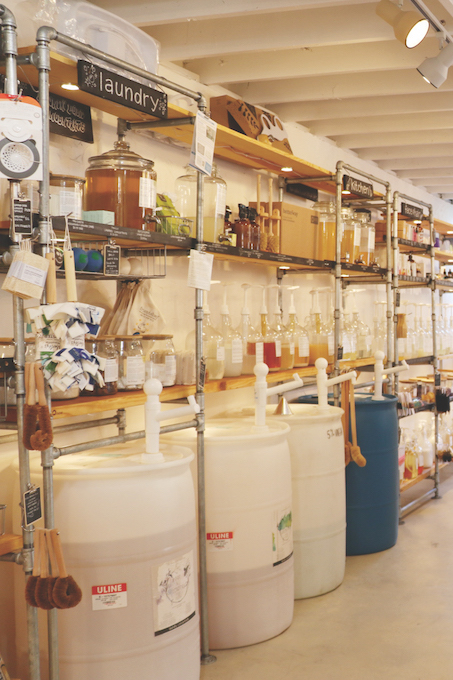
At Eco Now, which works in a similar way (selling by the ounce), Pauley says the bestsellers are laundry concentrate, toothpaste tablets, refillable all-natural perfumes and small-batch skin care products. The shop also carries a wide variety of other products, from reusable food wraps made of beeswax and travel cutlery sets to toilet paper made from bamboo rather than trees, wool balls that replace dryer sheets, natural cosmetics and gift items.
Both shops seek out brands that are local and closed loop, which means the brand reuses its packaging. So, for example, when a company delivers a big plastic drum of its liquid soap, it picks up the store’s empty container to be refilled later. Other products, like bar soap, are shipped in a cardboard box containing a durable plastic bag that can be reused over and over.
“We actually ship that box back with about 10 bags in it and they hold it for us, so when we reorder, they use them,” Pauley says. Other products, she notes, come in 5-gallon buckets that the store upcycles for community members to use as compost bins.
Building Community
In addition to providing compost containers, Eco Now hosts quarterly events like composting workshops, clothing swaps and seed swaps. With other stores in Anaheim and The LAB Anti-Mall in Costa Mesa (with more coming in Garden Grove and Riverside), the business has also offered candle-making classes and a fix-it fair to repair broken furniture and household items. The Ritual Refill also presents events, about once a month, from sound baths to a creative journaling workshop, clothing swaps and pop-ups with local vendors. The shop has even hosted a tea ceremony and a session focused on dyeing fabric with plant and food waste. Check both shops’ websites and social media channels for upcoming events.
“We’ve had such an incredible first year and a half,” Hall says. “Whether it’s coming back for refills, showing up for our events, or even just sharing our mission on social media, we are so grateful for the love and support our community has shown us. Our favorite part of what we do is getting to share our vision with the community.”

The goal for both shops is to provide resources to help people live sustainably. In college, Pauley biked to campus and tried to live as simply as possible. Her friends asked how she knew about these eco-friendly methods. “It seems like people want to do green living, but don’t know how,” she says.
So, in 2018, Pauley started selling handmade, reusable “eco towels,” a fabric alternative to paper towels, at farmers markets. Then she crafted fabric face wipes for removing makeup and reusable, on-the-go cutlery sets. “Single-use plastic cutlery kills me. Every time I see it, my heart breaks,” she says.
Eventually, her farmers market booth grew big enough to open a shop. Coming to a crossroads, she decided to commit full time to this venture rather than continuing her education. She opened her store in an Airstream at The LAB, which fell in line with her shop’s mission by upcycling the trailer. That ethos now extends to the all-natural paint on her stores’ walls and the use of wood rather than plastic price tags. The Laguna shop even utilizes gray water from the clothes washer—used to clean the staff’s aprons and towels that wipe up spills in the store—to water a little planter of flowers outside.
The Sustainability Shift
Another approach to reducing the reliance on plastics can be found at A New Earth Project’s showroom, which opened last year on South Coast Highway and focuses on product and shipping packages.
The campaign was started by Wes Carter—president of Atlantic Packaging, one of North America’s largest privately held packaging companies—after noticing widespread plastic pollution while on surf trips around the world. Along the way, a coalition of outdoor enthusiasts, industry-leading brands and innovative packaging suppliers have joined him in this mission.
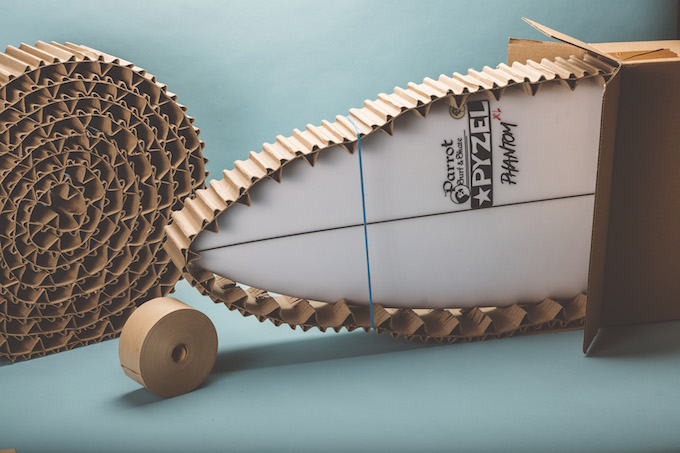
Laguna Beach resident and lifelong surfer Don Meek came on board as managing director of A New Earth Project with 40 years of experience in the media industry and plenty of ideas to take this effort to the next level. From a TV series called “Journey to A New Earth” on Amazon Prime to a film in production, one of the goals is to raise awareness.
Meanwhile, the showroom features creative sustainable packaging solutions, all made from renewable resources and fully curbside recyclable. “The nice thing about being in Laguna [is] there are so many people who live here that are in decision-making positions with brands and sustainability,” Meek says.
Many of the options trade plastic for corrugated cardboard—such as a system that protects surfboards for shipping without bubble wrap and foam—or crimped paper, which can be recycled or composted. A New Earth Project has also partnered with some innovative companies like Cruz Foam, a Santa Cruz business that’s turning shrimp shells into a Styrofoam alternative, and Ecovative, which is replacing molded plastic package inserts (that might hold a surfboard fin, for example) with those made of hemp and mycelium, the root structure of mushrooms. “It’s got a shelf life of 30 years, but if you throw it in your garden it will compost in 90 days,” Meek says of the hemp-mycelium inserts.
Playing Matchmaker
A New Earth Project helps bring together these innovative products with companies that can use them. “We’re working very closely now with Burton snowboards … to help them achieve their mission of getting all single-use plastic out of their consumer-facing packaging by the end of 2025,” Meek says.
The initiative also helped Williams Sonoma eliminate bubble wrap and air pillows from its e-commerce shipping. Locally, Catch Surf shop is a client as is Distant Local, a business run by former pro surfer Jeff Booth and his wife Melissa Martinez, who sell shirts, mugs and other items featuring artistic maps of beach towns around the country to celebrate the spirit of these surf communities. Nearby, San Clemente-based Album Surfboards and Stewart Surfboards both use shipping solutions from A New Earth Project.
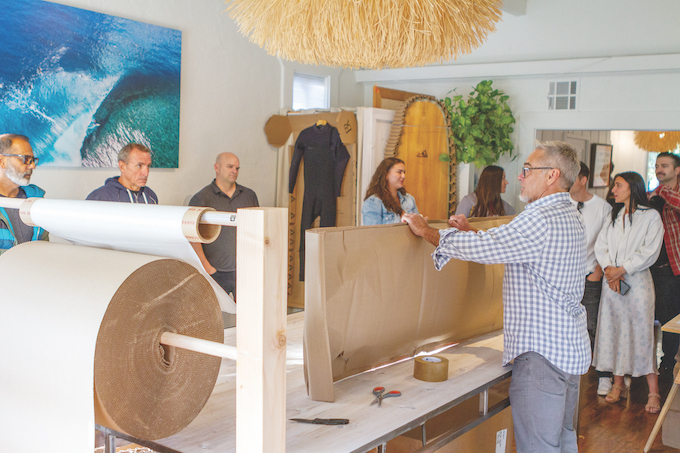
Sooner or later, companies will need to move toward sustainable options, Meek asserts. He points to California Senate Bill 54, which was passed last June and requires all packaging in the state to be recyclable or compostable by 2032. The legislation also shifts the burden away from consumers by raising $5 billion from plastic industry members over 10 years to assist with efforts to reduce plastic pollution.
“And then, on the other side, … consumers, particularly younger consumers, are beginning to be much more aware of the problem of single-use plastic packaging,” Meek says. “And they’re voting with their pocketbooks. And they’re saying, ‘I don’t think I want that.’ … So we have these two forces coming at these brands from two different sides—legislature and consumer demand—and we’re in a position to help those brands accelerate that transition.”
A New Earth Project is involved locally, too, as a sustainability partner of the Coast Film & Music Festival, which takes place in town from Nov. 8-12 this year. “We are sponsoring a sustainability day on Nov. 9,” Meek says. “… We’re going to invite the community to come down and hear stories about what is happening out there in the world about sustainability, what people themselves can do to improve their sustainability journey and what they can do at home.”
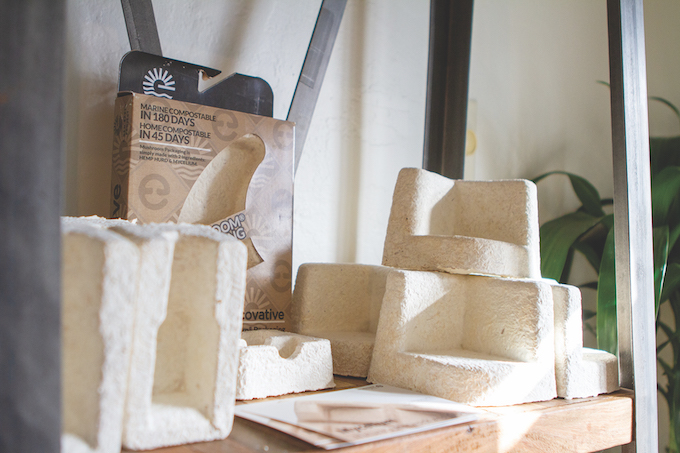
So whether it’s companies swapping plastic packaging for recyclable and compostable options or consumers refilling their bath and home products instead of purchasing single-use plastic bottles, it all contributes to a more eco-friendly world.
“I honestly think this is the most important thing in our lifetime to tackle,” Pauley says of the environmental effort. “Because if we don’t have a healthy planet and we don’t have healthy bodies, what do we have?”




